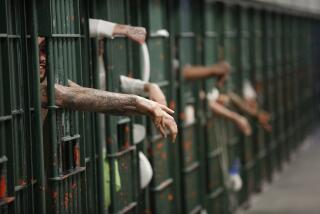Mexican Firm’s Director a Fugitive in Bank Scandal
- Share via
MEXICO CITY — This nation’s fast-expanding private banking industry was rocked Tuesday when the government seized Mexico’s fifth-largest financial group and issued an arrest warrant for its dynamic chairman, Carlos Cabal Peniche.
It was the second scandal to hit Mexico’s recently privatized investment houses in three months, and officials said it might imperil a major deal involving California-based Del Monte Foods Corp.
Cabal, 38, a cutting-edge symbol of Mexico’s new generation of 1990s-style entrepreneurs, was widely suspected to have left the country.
He and several directors of Mexico City-based Grupo Financiero Union masterminded a self-lending scheme that siphoned assets from the group’s two major banks “with the sole purpose of making resources available to Mr. Cabal Peniche,” Finance Minister Pedro Aspe Armella asserted Tuesday.
The government made no official statement on Cabal’s whereabouts. But late Tuesday, the attorney general’s office announced that it had arrested nine key officers of the group and its subsidiaries and that Cabal was not among them. The Mexican judiciary confirmed that Cabal and three key directors were still at large.
Mexican Treasury officials said at a news conference Tuesday that National Banking Commission investigators documented the funneling of at least $200 million from assets of the group’s Banco Union and Banca Cremi via “grave irregularities” to provide Cabal with “resources from the bank to acquire shares of various companies.”
One senior official estimated that the alleged fraud ultimately could run up to $700 million.
Cabal is considered one of Mexico’s wealthiest industrialists, with far-flung interests in agriculture, timber, newspapers and hotels in addition to the two banks. But controversy has sometimes followed him.
Cabal was touched by the BCCI bank scandal when it became known that he had repaid a $60-million loan from a Bank of Credit and Commerce International affiliate with $30 million in cash and stock from one of his companies. In June, a Cabal spokesman denied reports that he was being investigated by the Manhattan district attorney’s office for his BCCI involvement.
Starting with his father’s lumber, farming and retail businesses based in his native Merida in the Yucatan Peninsula, Cabal over the past 15 years built an empire that encompassed two of Mexico’s largest banks, vast agricultural operations and a piece of the Camino Real luxury hotel chain.
The senior government official indicated that the action against Cabal and his group probably would affect their plans to buy Del Monte Foods of San Francisco, one of the world’s leading processors of fruits and vegetables, with $1.6 billion in sales and 13,500 employees worldwide. The attempted purchase was seen at the time as a bid to exploit the North American Free Trade Agreement.
Cabal and a group of international investors were to pay $277 million in cash and assume almost $700 million worth of Del Monte’s debt under the deal, which wasn’t completed. A Del Monte spokeswoman declined comment Tuesday except to say the company will for the time being remain the possession of its owners, an investment partnership headed by Merrill Lynch and Citicorp.
In 1992, Cabal acquired a different entity, Del Monte Fresh Produce of Coral Gables, Fla., for $500 million. Del Monte Fresh Produce is the world’s largest pineapple grower and third-largest banana producer. The firm has 400 U.S. employees and grows cantaloupe and honeydew melons in California.
A spokesman for Del Monte Fresh Produce in Coral Gables said the events in Mexico had caught the company by surprise but that it was conducting business as usual. Both Del Monte units were once parts of the RJR Nabisco conglomerate sold off piecemeal after the company’s $25-billion management buyout in 1989.
Tuesday’s developments, Mexico’s second major investment scandal in three months, were briefly noted by this nation’s volatile investment markets, but after an early drop the Mexican stock exchange finished the day up 38 points, or 1.4%.
“This is not a generalized situation. I doubt that these practices have been followed by the rest of the big Mexican banks,” said Jose A. Garcia-Cantera, Latin American bank analyst with Salomon Bros. in New York.
Garcia-Cantera said he expects the government to sell the banks to a Mexican group, an international buyer or to the previous owners of Banca Cremi. Aspe late Tuesday confirmed that the government will try this.
Trading in Banca Cremi, Mexico’s fourth-largest bank and Grupo Financiero Union’s only publicly traded subsidiary, was suspended at the start of business Tuesday.
The government, which launched a bold program to privatize the banking industry three years ago under the radical economic reform policies of President Carlos Salinas de Gortari, had sought to minimize the effect of its move against Grupo Financiero Union from the moment it made the action public Monday night.
In announcing the seizure of the two banks and the group’s six other major financial subsidiaries, and the judicial arrest warrants for Cabal and three other leading directors, Finance Minister Aspe said he was taking extreme action to protect investors, shareholders and depositors.
He also stressed that Grupo Financiero was the only institution in which government investigators had uncovered such serious irregularities after an exhaustive audit of the banking sector.
“As a consequence (of the seizure), savers, depositors and creditors of Banca Cremi and Banco Union will not suffer a loss,” Aspe declared in his brief statement Monday night.
He said the group will now be administered, under government supervision, by Carlos Aguilar Villalobos, general accountant of the nation’s second-largest financial group, Grupo Financiero Bancomer.
This is similar to the arrangement the government made in late May, when it seized Grupo Havre amid official charges that the financial group had improperly altered its books and provided false information to Treasury investigators.
After taking administrative control of Havre, Treasury officials reported uncovering more irregularities, similar to those discovered at Grupo Financiero Union. Regulators specifically cited its advancing under-collateralized loans to “ghost” companies.
But on Tuesday the senior Treasury official on the government team overseeing the privatizing of the banking and investment industries made it clear the government was determined to prosecute Cabal.
Cabal’s whereabouts were unknown Tuesday. There were widespread reports that he had fled Mexico, and Treasury officials said that, if that were true, they would try to extradite him to answer charges.
Fineman reported from Mexico City, Kraul from San Diego.
More to Read
Sign up for Essential California
The most important California stories and recommendations in your inbox every morning.
You may occasionally receive promotional content from the Los Angeles Times.










